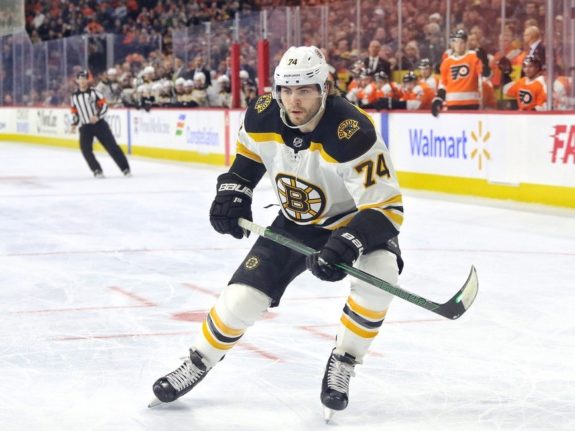This offseason will be a defining one for the Boston Bruins. Discussions about Torey Krug’s contract talks have already hit the news, but beyond Krug, the Bruins have a lot more decisions to make.
Jaroslav Halak, Kevan Miller, Zdeno Chara, and Joakim Nordstrom join Krug as unrestricted free agents. Matt Grzelcyk, Anders Bjork, Karson Kuhlman, and of course, Jake DeBrusk, will be restricted free agents.
Related: One for the Ages: Doug Harvey’s 1968-69 NHL Season
The Bruins cleverly opened up an additional $3 million in cap space with their trade deadline deals, giving them some additional breathing room for the offseason. High on their priority list will be DeBrusk, but how much is he worth?
Factors Affecting DeBrusk’s Contract
As a restricted free agent, the Bruins will have control over negotiations with DeBrusk. Still, there are a number of factors that will affect the type of deal being sought.
Cap space will be a factor – particularly how much room the Bruins have remaining if they re-sign Krug. How much Krug will earn this offseason depends on where he intends to sign. He could gain upwards of $8 million per season if he decides to leave, but remaining in Boston may require taking a hometown discount in the $6.5-7 million range – which would still put him among or above the highest-paid Bruins.
Related: Top 10 NHL Goalie Prospects
But back to DeBrusk, nothing is more important than the 23-year-old’s performance. The best way to describe DeBrusk’s first three seasons in the league is: promising, but not explosive.

DeBrusk, who was drafted 14th overall in 2015, has been a positive force throughout his entry-level deal. Through his first two seasons with the Bruins, he averaged .62 points-per-game. Although he tallied one fewer point in his sophomore season (2018-19), he scored more goals with 27 compared to 16 the season before.
This season, he’s tallying points at a slightly lower rate, but a hot streak (which DeBrusk is prone to) could put him right back or above his performance from his first two seasons. Overall, I think the Bruins must be satisfied with his role so far.
Related: Montreal Forum – 1908-1996
At the same time, he hasn’t exploded in the same vein as, say, David Pastrnak. This is an unfair comparison, as it would be for most players in the league, since Pastrnak’s emergence as an NHL star is rare. But the point is, while DeBrusk has done pretty well, he’s not in the same category as Pastrnak, who signed what is now considered an extremely team-friendly $6.67 million average deal in 2017.
DeBrusk will likely never produce at the same rate as Pastrnak. Very few players in the NHL will. But there’s still room for improvement, specifically with regards to consistency, in DeBrusk’s game.
The goal he scored on Tuesday is the perfect example. It was, by any measure, a filthy goal. DeBrusk showed off his speed, his hands, and his ability to stick with the play, and ended up with a highlight-reel finish. At the same time, the goal snapped a 10-game pointless streak for number 74. The talent is there, but the consistency could be better.
Building a Bridge Deal
What does this mean? At the end of the day, it comes down to two numbers: term and money. Given everything we’ve discussed, the best way to handle it – for both parties – is to work out a bridge deal.
Last offseason, I wrote a similar piece projecting DeBrusk’s next contract, that pointed out the importance of this season if he wanted to see a significant bump in pay. Considering this season he’s been on par with what we’ve come to expect from DeBrusk, a shorter-term deal with a decent (but not large) salary bump makes sense; say, roughly 3 years, $3.75 million.
For the Bruins, a deal like this would allow them to keep a promising young player who has room to grow. Just as importantly, it does so pretty cheaply.

For DeBrusk, it does a couple of things: it gives him a solid salary increase from the $1.29 million he’s averaging on his entry-level deal right now; and, more importantly, it allows him to bet on himself and cash in more handsomely while he’s still in his prime.
With a three-year deal, DeBrusk would become a free agent after his age-26 season. If he continues to improve – or even breaks out to become a 35+ goal scorer over the next few seasons – he could cash out on a longer-term, bigger-pay deal when he’s hitting his prime years.
Ultimately, it’s in the best interest of both DeBrusk and the Bruins to come to an agreement on a bridge deal. It gives DeBrusk a well-earned bump at a fair price while leaving the opportunities open for the future.